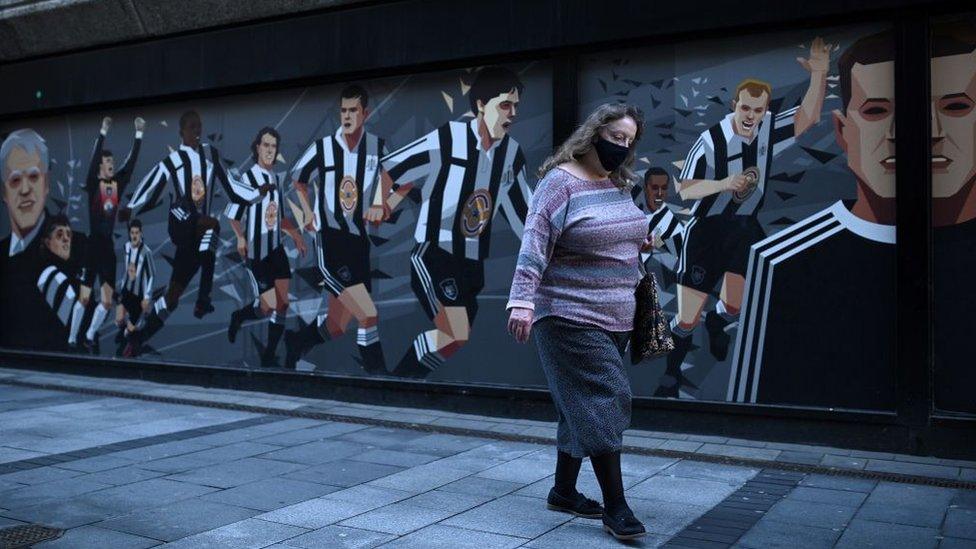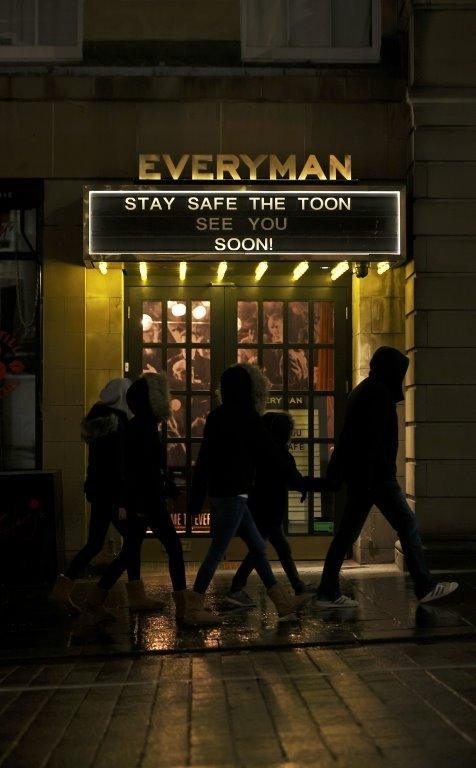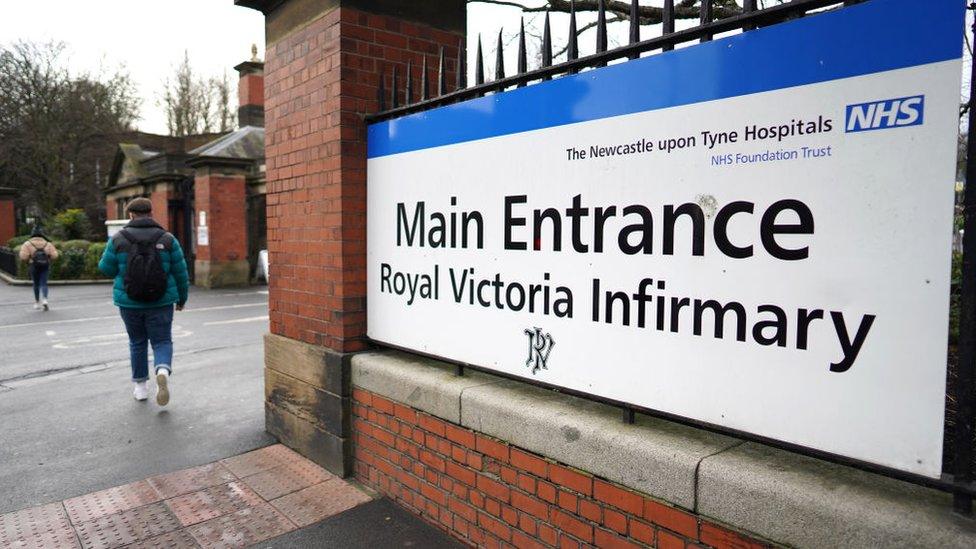Covid: Signs of hope among Newcastle's shuttered streets
- Published

BBC Radio 4 Today presenter Nick Robinson is in Newcastle upon Tyne, where the BBC is hosting Lockdown Live: What Next?, a special programme that marks a year since the first UK lockdown was announced.
Stay safe the Toon. See you soon!
That message above the entrance to the Everyman cinema on Newcastle's historic Grey Street is a reminder of what we're all missing. So too are the posters outside the Theatre Royal: "There will be a short interval."
It is, however, the closed shutters on bars and cafes and restaurants that are really stark reminders. This street in a city which takes pride in its reputation as a party town would normally be filled with people having fun long into the night.

Everyman's sign is a reminder of what we're all missing
These days it is empty, save for a few kids on skateboards, the riders queueing up to take food to people shut up in their homes and a few late-night dog walkers.
There are signs, however, of a city preparing to open again. Come 12 April, people will be able to eat out and drink outside again, providing they're willing to wrap up warm and huddle beneath an outdoor heater.
Bar Luga's owner Ollie Vaulkhard, a well-known entrepreneur in the city, is preparing to welcome people back on to his outdoor terrace. A third of people are still terrified of Covid, he tells me. A third couldn't care less and a third are persuadable. That, he believes, adds up to plenty of business.
This pandemic has, he says, weeded out good businesses from the bad. He compares it to the meteorite that wiped out the dinosaurs but left others to take over the planet.
Newcastle, like the rest of the country, knows that we will all have to learn to live with the coronavirus
The people in charge of this city have no doubt that once the lockdown is fully lifted there will be full bars, restaurants and shops too. What worries them, though, is how many will not reopen. How much damage the Covid meteorite will have done.
600 job applicants
This city, this region, remembers all too well the lost generation of the Thatcher era - young people who could not find work in the early 1980s and, as the years past, never could.
At the Prince's Trust youth centre Jess, who dreams of opening a cake shop one day, tells me about applying for a job at Wickes, the home improvement retailer. She was one of 200 applicants. Bailey has a similar story, except he was up against 600 people when he applied for an apprenticeship with Amazon.
Just south of the city, the Hebburn Helps community food bank helps put food on the table for those who are no longer able to do it themselves. They've seen demand for food parcels triple during the pandemic. In the last month alone, the charity FareShare North East has distributed 163 tonnes of food - enough to provide 388,100 meals.
Food bank manager Jo Durkin says she's now seeing people she never used to see use its services. As we are talking a smart new car pulls up.
A well-dressed young woman emerges to look at the table of items past their sell-by dates - bread and tinned ratatouille. "I didn't even know this place was here," she tells me. That was before she lost her job as an assistant manager in retail. Now the food bank makes the difference between being able to buy her kids an ice cream or having to tell them that mummy cannot afford to get them a treat. She asks me not to use her name. Poverty - even pandemic poverty - is so often accompanied by shame.

Newcastle's Royal Victoria Infirmary was the first in the UK to treat Covid patients last year
There are, though, signs of hope here. The Royal Victoria Infirmary, the first in the UK to treat Covid patients, now has very few on its wards. The experience of the past year means that no-one here is willing to declare the crisis over.
Dr Gus Vincent, clinical director for intensive care, remembers when he and his colleagues believed that if they isolated those first two patients from China they might contain the disease altogether. It was not to be.
What, I ask him, are you most looking forward to when the lockdown is over? A pint at the pub down the road from the hospital he tells me. And, I add, a little too optimistically, never having to talk about Covid again. He smiles the smile of a man whose weathered a year of constant pressure and occasional panic. No, he corrects me gently. Not that.
At the end of a year none of us believed we'd live through, Newcastle, like the rest of the country, knows that we will all have to learn to live with the coronavirus.
Watch Lockdown Live: What Next? on BBC One on Tuesday 23 March, at 19:00 GMT, or later on the BBC iPlayer